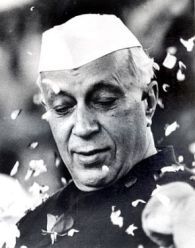 'Nehru is often portrayed as a visionary with his head in the clouds. But he had his feet firmly planted on the ground when it came to building and nurturing institutions and setting them on the right path with the right traditions,' says B S Raghavan.
'Nehru is often portrayed as a visionary with his head in the clouds. But he had his feet firmly planted on the ground when it came to building and nurturing institutions and setting them on the right path with the right traditions,' says B S Raghavan.
Jawaharlal Nehru was the darling of the youth in my school and college days, and the closest I could get to him, my idol, before I joined the IAS, was as part of a sea of human beings he addressed as prime minister on the Island Ground at Madras in 1950.
The podium from which he addressed the meeting was nearly half-a-mile away, and the figures on it were hazy. It was, of course, easy to make out the churidar and sherwani of Nehru and the diminutive M Bhakthavatsalam in his dhoti.
One sensational tidbit for the press from this meeting was Nehru shouting, 'Don't disturb me!' when poor Bhakthavatsalam, in all good intention, extended a glass of water towards Nehru while he was speaking.
Jawaharlal Nehru is often portrayed as a visionary with his head in the clouds. This was true only to the extent that, brought up as he was by Mahatma Gandhi, his commitment to basic human and ethical values was total and he had no use for underhand or devious dealings.
But he had his feet firmly planted on the ground when it came to building and nurturing institutions and setting them on the right path with the right traditions. The string of national laboratories and research institutions to kindle and nurture the 'scientific temper', the Planning Commission, the Atomic Energy Commission and the Parliament itself are the beneficiaries of the blend of vision and practical sense, purity of means and clarity of goals, that he brought to bear on them.
Not until I joined the home ministry at New Delhi in 1961 as a deputy secretary did anything at all like a functional relationship with him begin. Nehru had a few months earlier convened the National Integration Conference which had constituted as its executive arm the National Integration Council (NIC) comprising 40 members representing every shade of opinion.
It spoke volumes for the tolerance and broadmindedness of those days that Nehru included in the membership of both the Conference and the Council those who were opposed to his policies and approach and who, indeed, were his trenchant critics.
Matters coming within the purview of the Conference and the Council were assigned to the home ministry and I headed its secretariat, in addition to my other duties, for the next nine years.
As secretary of the NIC right from its inception in 1961, I worked with three prime ministers who were also its chairpersons. Expectedly, Jawaharlal Nehru made use of the Council to the maximum extent. Indeed it was his brain-child and national, emotional and cultural integration was his life-long passion.
Lal Bahadur Shastri's tenure (1964 to 1966) as PM was too short and too tumultuous (with a war with Pakistan in 1965 thrown in) for him to call a meeting of the NIC. Indira Gandhi convened the Council only twice during her two spells of prime ministership.
The Council in its very first session in June 1962, at Nehru's instance, set up three committees to study and make recommendations on issues which he regarded as of paramount concern for the healthy growth of Indian democracy and the emotional integration of the polyglot polity.
Nehru was clear as to what those issues were: Combating communalism, countering regional separatist and fissiparous tendencies, and harnessing mass media to these ends.
I was sitting behind Nehru when he looked around the Vigyan Bhavan conference hall at the dignitaries (who included titans such as Sarvapalli Radhakrishnan, Zakir Hussain, Vikram Sarabhai and others, till this day names to conjure with) and himself picked the chairpersons and members of the committees one by one.
He made Asoka Mehta the chairperson of the committee on national integration and communalism with Atal Bihari Vajpayee, Indira Gandhi, E M S Namboodripad, Professor Mujeeb and a couple of others as members.
He had no difficulty in choosing Prithviraj Kapoor as the chairperson of the committee on mass media with prominent media and film personalities as members. (Incidentally, mark the fact that as early as 1961 Nehru had the farsightedness to put mass media at the centre-stage as an important means of forging a sense of integration).
Whom to make the chairperson of the committee to study and report on regional and separatist movements? With his spectacles hanging precariously at the tip of his nose and an impish smile playing on his lips, and with an exquisite sense of irony, Nehru looked at C P Ramaswami Iyer, and ever so sweetly, asked: 'Ramaswami, why don't you chair the committee? You are the fittest person I can think of!'
Was it my fancy or was it a fact I cannot tell: There was a giant sucking sound with which this choice was greeted and no wonder.
Someone like CP in today's political culture would have been hounded out of public life, if not physically eliminated, and perennially harassed by employing the power of the State in every conceivable manner to crush him. For, he was widely perceived to have worked against the freedom movement by overt and covert means and ratted on the freedom heroes.
He also moved earth and heaven for the continuance of the British Rule, even to the extent of goading the Chamber of Princes to declare the independence of the princely states.
Every school boy knew that CP himself set the example by proclaiming that Travancore would stand forth as an independent entity when the British quit India. I remember asking Lal Bahadur Shastri about the induction of this staunch separatist into a Council meant to work for integration.
Shastri replied: 'Nehru strongly believes that the most vital pre-requisite to national integration is emotional integration which is not possible unless present and erstwhile opponents on the political plane were also integrated into his effort.'
However that be, plainly startled by Nehru's question, CP squirmed in his seat and looked around perhaps to see whether Nehru meant him or somebody else. To his embarrassment, Nehru repeated his suggestion to which CP quietly submitted.
Nehru took particular care to include in this committee headed by CP political heavyweights such as Yashwantrao Balwantrao Chavan, the chief minister of Maharashtra, Biju Patnaik, the chief minister of Orissa, B P Chaliha, the chief minister of Assam, and K Kamaraj, the chief minister of Madras. Asoka Mehta was also brought in as a member to provide a linkage with his communalism committee.
I serviced all the three committees. When the Chinese invasion of November 1962 took place, the nation rose like one person and the emotional upsurge misled the committees on communalism and mass media into believing that integration had become a reality.
They decided to wind up their half-finished task. CP took a more down-to-earth and realistic stand. He wanted to take advantage of the upsurge by performing a coup de grace to preserve India's unity. He called me to his side and asked me to prepare, in consultation with the law ministry, a note proposing an amendment to the Constitution whereby all candidates for elections at all levels, all members elected to representative bodies and all Constitutional functionaries would be required to take an oath to uphold the sovereignty, unity and integrity of India.
We took it to Nehru to whom CP explained that this deceptively simple amendment would, in effect, outlaw any party or its candidates or its elected members or any Constitutional functionary refusing to take the prescribed oath and thus would serve as a potent antidote against separatist and secessionist tendencies.
Nehru immediately saw the point and approved it and the amendment was incorporated in the Constitution. Almost overnight, contrary to the Cassandras (including myself) who thought the DMK would scorch the earth if the amendment was passed, its supremo, C N Annadurai, in a spectacular act of statesmanship, prevailed upon the party to delete the demand for an independent Dravida Nadu from its constitution and ordered the candidates and elected representatives of the party to take the oath and live up to it -- which they do to this day.
This, then, was the lasting bequest of CP, the erstwhile arch separatist turned integrator, to Indian democracy. This shows how Nehru's breathtaking nobility and statesmanship paid off.
The three language formula also owes a lot to the inspiration of Nehru. An indirect offshoot of Nehru's vision of mass media as the unifier was the committee that was subsequently set up on the synchronous communications satellite, chaired by Vikram Sarbhai, of which I was a member.
It was this committee that laid the groundwork for knitting the entire country through satellite communication in the decades following.
Vikram was the greatest figure in the scientific world with whom I had the privilege to work. We travelled together discussing ways in which the satellite could be put to use for the dissemination of the message of the oneness of the nation. I was greatly captivated by his charm and versatility and thrilled when he asked me to write the report, despite the fact that I was not a technical person.
Looking back on those days, I am lost in amazement at my temerity in taking on Nehru on correct English usage. In one of the papers sent to him, I had concluded a sentence by saying that something or the other I was commenting on was 'beyond the pale'.
Nehru sharply looked up and growled, 'Beyond the pale of what?' I said that in modern English usage, it was enough if one said 'beyond the pale' as that itself stood for being beyond the pale of civilised conduct and the like.
Nehru fairly tore into me saying that he had never heard of such nonsense.
I held my ground and suggested looking into the latest edition of the Oxford dictionary. At that outrageous defiance, he threw the file and turned his face away, and after a while, got up and left the room. I was sure my goose was cooked, and went back to my office in indescribable panic.
The next morning, N K Seshan, who was Nehru's PA, phoned saying that the PM wanted me to see him at 4 in the evening. I went in trembling with fear. Nehru received me with unimagined sweetness, offered me tea and spoke for half an hour or more on his vision of India's future, its role in the comity of nations, the unfinished tasks etc. (I shall revert to his observations in the second part of the article.)
I emerged from his room deeply moved and also infinitely puzzled, until Seshan interpreted this memorable gesture as Nehru's way of saying sorry for losing his temper in the morning.
Part II: What Gandhiji said about Nehru should suffice for history











 © 2025
© 2025